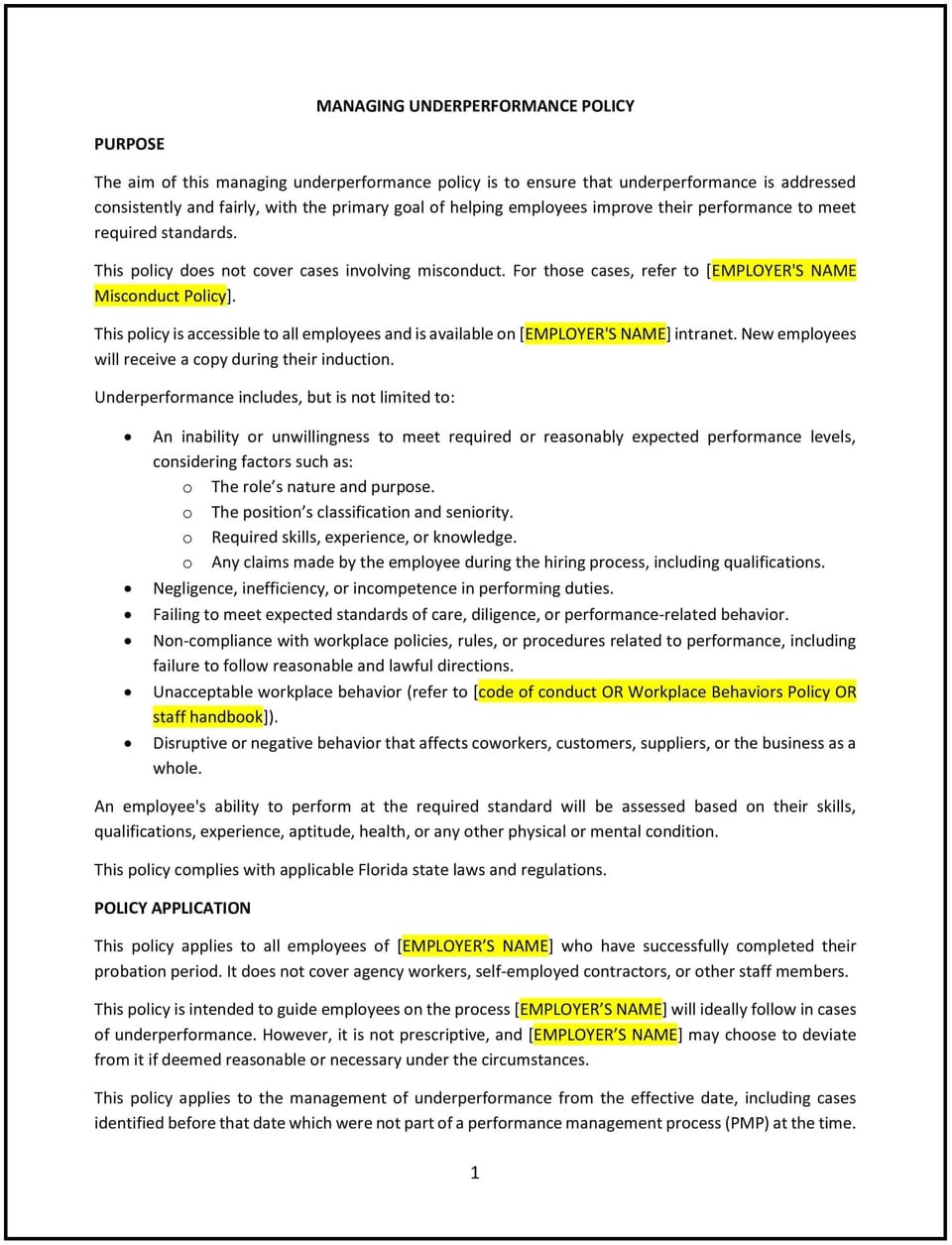Managing underperformance policy (Florida): Free template

Managing underperformance policy (Florida)
A managing underperformance policy helps Florida businesses address employee performance issues in a fair, constructive, and consistent manner. This policy outlines procedures for identifying, addressing, and resolving underperformance while supporting employees in improving their work outcomes. It is designed to promote accountability, reduce conflicts, and provide clear guidelines for fostering a culture of continuous improvement.
By implementing this policy, businesses in Florida can demonstrate their commitment to employee development, enhance operational efficiency, and align with the state’s focus on fairness and mutual respect in the workplace.
How to use this managing underperformance policy (Florida)
- Define underperformance: Clearly specify what constitutes underperformance, such as missed deadlines, low-quality work, or failure to meet expectations.
- Establish identification procedures: Outline how managers should identify and document instances of underperformance, including specific examples and measurable criteria.
- Address communication protocols: Explain how managers should discuss performance issues with employees, focusing on constructive feedback and collaboration.
- Provide support resources: Specify the types of assistance available to employees, such as training, mentoring, or additional resources to help them improve.
- Develop improvement plans: Provide guidance on creating performance improvement plans (PIPs) that include clear goals, timelines, and evaluation criteria.
- Communicate the policy: Share the policy with employees through handbooks, emails, or training sessions to ensure awareness and understanding.
- Monitor adherence: Regularly review how the policy is applied and address any concerns or discrepancies promptly.
- Update the policy: Periodically assess the policy to reflect changes in workplace dynamics, legal standards, or business needs.
Benefits of using this managing underperformance policy (Florida)
This policy offers several advantages for Florida businesses:
- Promotes accountability: Clear guidelines help employees understand expectations and take responsibility for their performance.
- Reduces conflicts: Defined procedures minimize misunderstandings and ensure consistent handling of performance issues.
- Builds trust: A fair and supportive approach demonstrates the business’s commitment to employee development and mutual respect.
- Aligns with community values: Reflects Florida’s emphasis on fairness, inclusivity, and fostering positive workplace relationships.
- Enhances reputation: Demonstrates the business’s dedication to ethical practices and employee well-being.
- Improves productivity: Addressing underperformance helps employees reach their full potential, benefiting the business as a whole.
- Supports growth: A robust framework fosters a culture of continuous improvement and adaptability.
Tips for using this managing underperformance policy (Florida)
- Communicate clearly: Ensure employees and managers understand the policy by providing written materials and discussing it during meetings or training sessions.
- Train managers: Educate supervisors on how to identify underperformance, provide constructive feedback, and implement improvement plans effectively.
- Be supportive: Focus on helping employees succeed by offering resources, training, and mentorship rather than punitive measures.
- Stay objective: Base decisions on measurable criteria and documented evidence to ensure fairness and consistency.
- Encourage feedback: Solicit input from employees to identify areas for improvement and ensure the policy meets their needs.
- Review periodically: Assess the policy’s effectiveness and make updates as needed to reflect changes in workplace dynamics or business goals.
Q: Why should Florida businesses adopt a managing underperformance policy?
A: Businesses should adopt this policy to promote accountability, reduce conflicts, and demonstrate their commitment to supporting employees in improving their performance.
Q: What should businesses do if an employee shows signs of underperformance?
A: Businesses should identify the issue promptly, document specific examples, and engage in open dialogue with the employee to understand the root cause and provide support.
Q: Should businesses create performance improvement plans (PIPs)?
A: Businesses should develop PIPs that include clear goals, timelines, and evaluation criteria to help employees address underperformance in a structured way.
Q: How should businesses handle repeated underperformance?
A: Businesses should follow a progressive approach, escalating actions such as additional training, formal warnings, or other measures while ensuring fairness and consistency.
Q: What types of support should businesses offer to underperforming employees?
A: Businesses should provide resources such as training, mentoring, or access to tools and materials to help employees improve their skills and meet expectations.
Q: How can businesses ensure fairness in managing underperformance?
A: Businesses should base decisions on objective criteria, document all interactions, and apply the policy consistently across all employees.
Q: How often should businesses review the policy?
A: Businesses should review the policy annually or whenever there are significant changes in workplace dynamics, legal standards, or business operations.
This article contains general legal information and does not contain legal advice. Cobrief is not a law firm or a substitute for an attorney or law firm. The law is complex and changes often. For legal advice, please ask a lawyer.


